瓦市小学牛津英语6A模块1口试复习资料
牛津6AUnit1知识点整理(通用3篇)
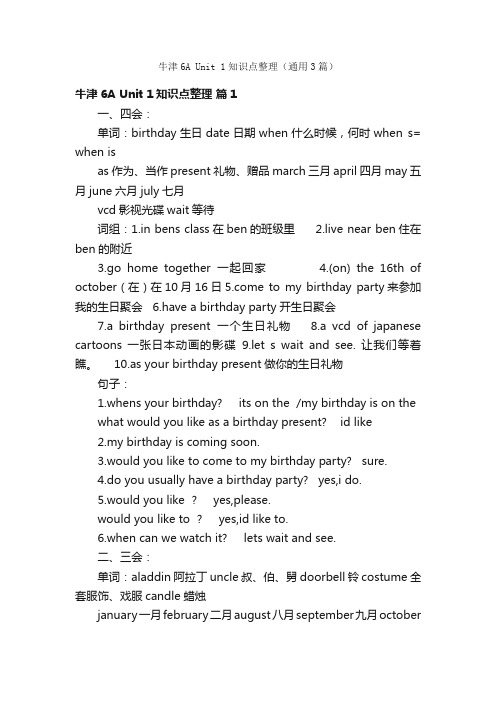
牛津6A Unit 1知识点整理(通用3篇)牛津6A Unit 1知识点整理篇1一、四会:单词:birthday生日date日期when什么时候,何时when s= when isas作为、当作present礼物、赠品march三月april四月may五月june六月july七月vcd影视光碟wait等待词组:1.in bens class在ben的班级里 2.live near ben住在ben的附近3.go home together一起回家4.(on) the 16th of october(在)在10月16日e to my birthday party来参加我的生日聚会6.have a birthday party开生日聚会7.a birthday present一个生日礼物8.a vcd of japanese cartoons 一张日本动画的影碟9.let s wait and see. 让我们等着瞧。
10.as your birthday present做你的生日礼物句子:1.whens your birthday? its on the /my birthday is on thewhat would you like as a birthday present? id like2.my birthday is coming soon.3.would you like to come to my birthday party? sure.4.do you usually have a birthday party? yes,i do.5.would you like ? yes,please.would you like to ? yes,id like to.6.when can we watch it? lets wait and see.二、三会:单词:aladdin阿拉丁uncle叔、伯、舅doorbell铃costume全套服饰、戏服candle蜡烛january一月february二月august八月september九月october十月november十一月december十二月first第一second第二third第三fourth第四fifth第五sixth第六twelfth第十二twentieth第二十twenty-first第二十一词组:1.have a cake with lots of strawberries吃一块草莓蛋糕2.happy birthday to you!祝你生日快乐3.take off脱下take off his costume脱下戏装4.blow out吹灭blow out the candles吹灭蜡烛5.open the door开门句子:1.the doorbell is ringing.2.he is giving ben some cartoons as a birthday present.3.ben is blowing out the candles on the cake.its time for some cake.三、语音:/ / dear hear near year牛津6a unit 2知识点整理来自。
牛津沪教版六年级上6A-Unit 1 知识点梳理 + 拓展阅读

6A Module 1 Family and friendsUnit 1 Family and relatives知识点梳理I. Useful words and expressions1. family与relativesfamily通常指自己的父母、兄弟姐妹等成员。
Relatives指的是除此之外与自己有血缘关系或非血缘关系的亲属。
2. 中英家庭称谓区别grandfather: 祖父,外祖父;grandmother: 祖母,外祖母;uncle: 叔父,舅舅,姨夫,姑父;aunt: 姑姑,姨母,婶婶,舅母;cousin: 堂兄弟姐妹,表兄弟姐妹;3. Alice has got a lot of presents and birthday cards from her family and relatives.a lot of 许多大量,后面加可数名词复数或不可数名词,相当于lots of。
get sth. from sb.: 从某人那里得到某物。
4. These are my uncles and this is my aunt.在介绍人物时,常用this is或these are这种句型,而不用使用he/she is, they are句型。
5. – Alice, what do you do with your aunt? – I usually go shopping with my aunt.问句中出现的第一个do是助动词,用于对实意动词的一般疑问句提问,其否定句形式是don’t。
同样作用的助动词还有does和did。
go shopping 去购物。
动词go后面跟动词时,常常接动词的-ing形式。
e.g., go swimming去游泳go cycling去骑车go fishing去钓鱼go camping去野营6. I always play football with my father.动词play后直接跟球类运动时,不需要加定冠词the。
牛津沪教版英语六年级上6A寒假复习Module 1辅导讲义
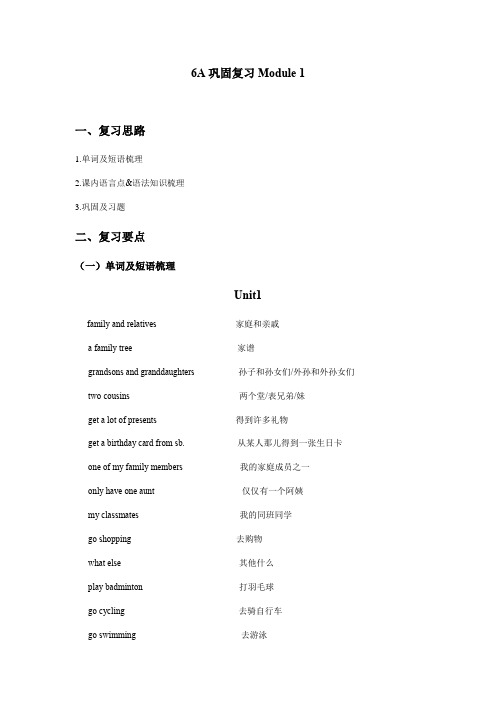
6A巩固复习Module 1一、复习思路1.单词及短语梳理2.课内语言点&语法知识梳理3.巩固及习题二、复习要点(一)单词及短语梳理Unit1family and relatives 家庭和亲戚a family tree 家谱grandsons and granddaughters 孙子和孙女们/外孙和外孙女们two cousins 两个堂/表兄弟/妹get a lot of presents 得到许多礼物get a birthday card from sb. 从某人那儿得到一张生日卡one of my family members 我的家庭成员之一only have one aunt 仅仅有一个阿姨my classmates 我的同班同学go shopping 去购物what else 其他什么play badminton 打羽毛球go cycling 去骑自行车go swimming 去游泳how many + 名词复数多少……Unit2Ⅰ. 词性转换1.friend n. 朋友→friendly adj. 友好的→* friendship n.友谊2.help n./v.帮助→helpful adj.有帮助的→* helpless adj.无帮助的3.one的序数词→first4.pollute v. 污染→pollution n.污染5.discuss v. 讨论→*discussion n. 讨论e n.用法,用处v.使用→useful adj.有用→* reuse v. 再利用1.talk to/with her和她交谈2.not…at all一点也不……3.like to play together喜欢一起玩4.almost every day几乎每一天5.can’t read or write不能读和写6.go out at night在晚上出去7. a little dog一条小狗8.like to be together喜欢在一起9.walk to school= go to school on foot步行去学校10.eat their lunch吃午饭11.share their food分享食品12.help each other互相帮助13.help other people帮助他人14.friendly and helpful友善待人,助人为乐15.work hard勤奋学习16.be (never) late for school上学(从不)迟到17.(never) get angry(从不)生气。
牛津小学英语6A复习资料
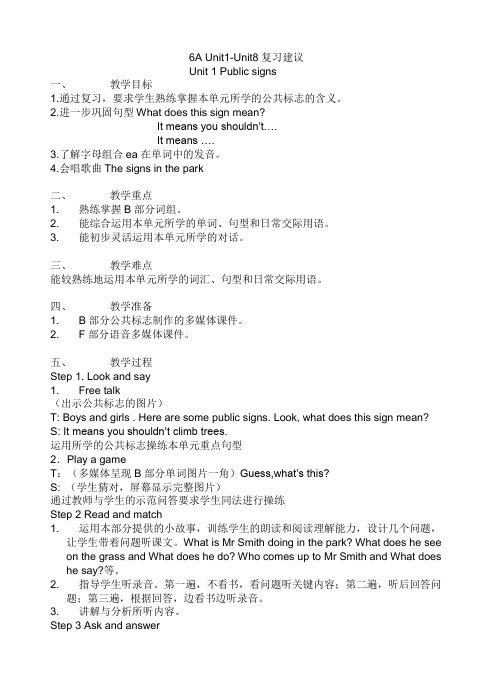
6A Unit1-Unit8复习建议Unit 1 Public signs一、教学目标1.通过复习,要求学生熟练掌握本单元所学的公共标志的含义。
2.进一步巩固句型What does this sign mean?It means you shouldn’t….It means ….3.了解字母组合ea在单词中的发音。
4.会唱歌曲The signs in the park二、教学重点1. 熟练掌握B部分词组。
2. 能综合运用本单元所学的单词、句型和日常交际用语。
3. 能初步灵活运用本单元所学的对话。
三、教学难点能较熟练地运用本单元所学的词汇、句型和日常交际用语。
四、教学准备1. B部分公共标志制作的多媒体课件。
2. F部分语音多媒体课件。
五、教学过程Step 1. Look and say1. Free talk(出示公共标志的图片)T: Boys and girls . Here are some public signs. Look, what does this sign mean? S: It means you shouldn’t climb trees.运用所学的公共标志操练本单元重点句型2.Play a gameT:(多媒体呈现B部分单词图片一角)Guess,what’s this?S: (学生猜对,屏幕显示完整图片)通过教师与学生的示范问答要求学生同法进行操练Step 2 Read and match1. 运用本部分提供的小故事,训练学生的朗读和阅读理解能力,设计几个问题,让学生带着问题听课文。
What is Mr Smith doing in the park? What does he see on the grass and What does he do? Who comes up to Mr Smith and What does he say?等。
2. 指导学生听录音。
牛津小学英语6A 复习要点1
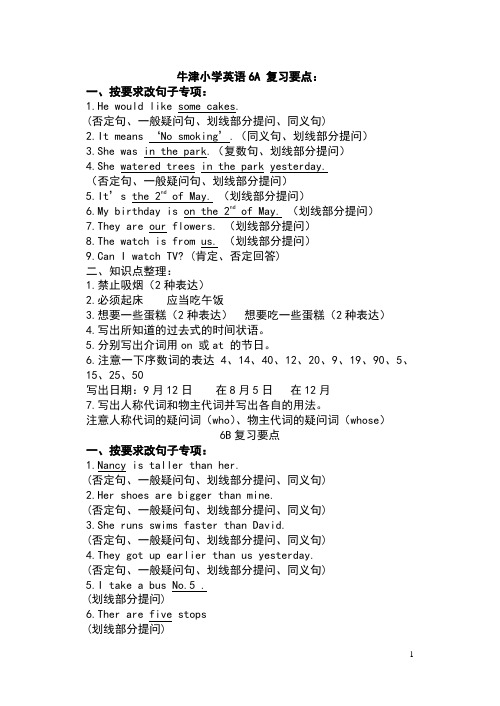
牛津小学英语6A 复习要点:一、按要求改句子专项:1.He would like some cakes.(否定句、一般疑问句、划线部分提问、同义句)2.It means ‘No smoking’.(同义句、划线部分提问)3.She was in the park.(复数句、划线部分提问)4.She watered trees in the park yesterday.(否定句、一般疑问句、划线部分提问)5.It’s the 2nd of May. (划线部分提问)6.My birthday is on the 2nd of May. (划线部分提问)7.They are our flowers. (划线部分提问)8.The watch is from us. (划线部分提问)9.Can I watch TV? (肯定、否定回答)二、知识点整理:1.禁止吸烟(2种表达)2.必须起床应当吃午饭3.想要一些蛋糕(2种表达)想要吃一些蛋糕(2种表达)4.写出所知道的过去式的时间状语。
5.分别写出介词用on 或at 的节日。
6.注意一下序数词的表达 4、14、40、12、20、9、19、90、5、15、25、50写出日期:9月12日在8月5日在12月7.写出人称代词和物主代词并写出各自的用法。
注意人称代词的疑问词(who)、物主代词的疑问词(whose)6B复习要点一、按要求改句子专项:1.Nancy is taller than her.(否定句、一般疑问句、划线部分提问、同义句)2.Her shoes are bigger than mine.(否定句、一般疑问句、划线部分提问、同义句)3.She runs swims faster than David.(否定句、一般疑问句、划线部分提问、同义句)4.They got up earlier than us yesterday.(否定句、一般疑问句、划线部分提问、同义句)5.I take a bus No.5 .(划线部分提问)6.Ther are five stops(划线部分提问)7.The bus stop is over there.(划线部分提问)8.I like summer best.(否定句、一般疑问句、划线部分提问、同义句)9.I’m going to play football tomorrow.(否定句、一般疑问句、划线部分提问)10.I’m going to the park.(划线部分提问)11.It’s sunny. (划线部分提问)二、知识点整理:1.形容词和副词的比较级的组成2.as+形容词和副词原形+as 和…一样3.in the streeton the road\on the right(left)at the stop\at the crossing4.get on\get off5.和南京一样热比南京更热6.周末计划顺便问一下在音乐会上7.Can I have some …?三、复习要点:(括号内主要适合的题型)1.四会单词(单词默写、英汉互译)四会句型(根据汉语意思写句子)2.三会单词(英汉互译)三会句型(选择题)3.课文读背(听力、选择题、作文)4.每单元主要知识点的掌握5.听力题、语音题、作文易失分。
牛津小学英语6A复习提纲
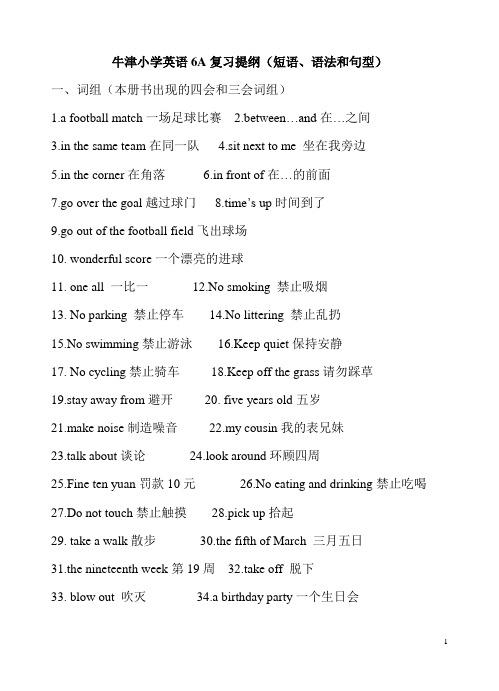
牛津小学英语6A复习提纲(短语、语法和句型)一、词组(本册书出现的四会和三会词组)1.a football match一场足球比赛2.between…and在…之间3.in the same team在同一队4.sit next to me 坐在我旁边5.in the corner在角落6.in front of在…的前面7.go over the goal越过球门8.time’s up时间到了9.go out of the football field飞出球场10. wonderful score一个漂亮的进球11. one all 一比一 12.No smoking 禁止吸烟13. No parking 禁止停车 14.No littering 禁止乱扔15.No swimming禁止游泳16.Keep quiet保持安静17. No cycling禁止骑车18.Keep off the grass请勿踩草19.stay away from避开 20. five years old五岁21.make noise制造噪音22.my cousin我的表兄妹23.talk about谈论 24.look around环顾四周25.Fine ten yuan罚款10元26.No eating and drinking禁止吃喝27.Do not touch禁止触摸 28.pick up拾起29. take a walk散步30.the fifth of March 三月五日31.the nineteenth week第19周 32.take off 脱下33. blow out 吹灭34.a birthday party一个生日会35.a VCD of Chinese cartoons 一盘中国卡通片的VCD36.as a birthday present作为一份生日礼物37.a piece of paper一张纸 38.fold it in half对折39.a running race一场跑步比赛40.just now 刚才41.a moment ago刚才 42.a roll of film一卷胶卷43.a pair of glasses一副眼镜 44. in July在七月45. Sports Day体育活动日46. watch the moon赏月47. a pair of earphones一副耳机 48. last week上星期49. plant trees种树50. pull up carrots拔胡萝卜51. pick up oranges摘橘子52. on the farm在农场53. an exciting film 一部令人激动的影片54. in the mountains在山里55. a science festival 科技节56. a food festival美食节 57. a kite festival 风筝节58. National Day 国庆节59. have a chat聊天60. have a good time 过得愉快61. at the weekends 在周末62. after dinner晚饭后 63. a lot of colourful kites许多色彩艳丽的风筝64. Children’s Day儿童节65.New Year’s Day新年66. their relatives 他们的亲戚 67. something to drink一些喝的东西68. dress up装扮69. favourite food最爱的食物70. dragon boat race龙舟赛 71. last year去年72. Mid-Autumn Festival中秋节73.Dragon Boat Festival端午节74. Spring Festival春节 75. eat rice dumplings吃粽子76.make pumpkin lanterns 做南瓜灯77.police station 警察局78.this morning 今天早晨 79. get off 下车80. point to 指向81. at the back of 在后部82. the present from his friend 朋友送的礼物二、语法知识1、序数词序数词的构成是在以之相对应的基数词词尾加th,个别例外:◆one – first two—second three—thirdfive—fifth eight—eighth nine—ninthtwelve – twelfth◆以ty结尾的,先变y为i,加thforty—fortieth◆缩写形式1st 2nd3rd 4th 5th 22nd 31st2、规则动词的过去时词尾变化◆一般情况下加ed◆以不发音的e结尾的加d◆以辅音字母+y结尾的变y为i,加ed。
牛津小学英语6A自备复习资料全

单词:cousin堂(表)兄弟姐妹question问题public公共的 sign标志mean意思是bin箱子danger危险must必须 away(离)开grass草off脱离,(离)开cage笼子quiet安静noise噪声know知道conversation对话complete完全的smoke吸烟litter乱丢cycle骑自行车back回suddenly突然地note钞票,纸币match比赛around在周围,四面nearby附近的keeper看守人 point指出fine罚款rubbish废物,词组:1.禁止停车No parking2.禁止吸烟No smoking3.禁止吃喝No eating or drinking4.禁止践踏keep off the grass5.禁止乱丢杂物No littering6.禁止触摸Do not touch7.安静Keep /Be quiet 8.朝他走去come up to him 9.罚款5元FINE ¥510.在鸟笼上on the birds’cage 11.指向point to 12.只有四岁only four years old13.有许多问题have a lot of questions14.问问题ask question 15.公共标志public signs 16.禁止骑车No cycling 17.在危险中in dange r 18.制造噪音make noise19.散步take a walk 20.远离stay away from 21.一个公园看守员a park keeper 22.环顾look around 23.在草地上走walk on the grass 24.进去go in25.建筑物上的标志the sign on the building句型:1. 这个标牌是什么意思?What does this sign mean?它意指“危险”。
牛津沪教版六年级上6A-Unit 1 单元复习练习

Unit 1 RevisionName____________ Class ____________ Score ____________Part 1 Listening (25%)I. Listen and choose the right picture. (5%)A B CD E F1. 2. 3. 4. 5.II. Listen to the dialogue and choose the best answer to the question you hear. (10%)( ) 1. A. One. B. Two. C. Three. D. Zero.( ) 2. A. A picture. B. A key. C. A book. D. A ticket.( ) 3. A. She went to fishing at weekends.B. She watched TV at weekendsC. She stayed at home at weekends.D. She went swimming at weekends.( ) 4. A. October 17. B. October 16. C. October 26. D. October 27.( ) 5. A. In the supermarket. B. In the library.C. In the classroom.D. On the road.( ) 6. A. Some bread and milk. B. Two pieces of bread.C. a glass of milk.D. A piece of bread.( ) 7. A. By underground . B. By bus.C. On foot.D. By car.( ) 8. A. Danny. B. Tom. C. Nancy. D. Mary.( ) 9. A. Maths. B. Chocolate. C. Class. D. Weather.( ) 10. A. 65217886 B. 65127866 C. 65127886 D. 65127786III. Listen to the passage and tell whether the following statements are true or false. (5%)( ) 1. Bob is not very old and he has three old cars.( ) 2. He has no wife but he has four children.( ) 3. Bob gives different toys to different children.( ) 4. Bill and Mike like playing with toy cars.( ) 5. Bob is not a good father.IV. Listen to the passage and complete the table. (5%)1.Part 2 Vocabulary & Grammar (35%)I. Fill in the blanks with proper words according to the pictures. (5%)1 2 3 4 51. Ben usually does his at 7 p.m.2. I often go with my mother.3. Kitty often help her mother wash the .4. Please put on your .5. We often play in the afternoon.II. Spell out the words according to the phonetic symbols. (5%)1. On Sundays, Susan likes to go swimming with her ['kʌzn].2. I often visit my ['relətivz] on Sunday.3. He has ['əunli] one aunt.4. Peter ['ju:ӡʊəlɪ] plays games with his father.5. What [els] do you do with your grandfather?III. Choose the best answer. (10%)()1. I have _______ aunt and _______ uncle.A. an, anB. an, aC. a, anD. a, a()2. Kitty _______ finishes her homework on time. She never leaves it for tomorrow.A. neverB. alwaysC. sometimesD. usually()3. Tom has got a lot of Christmas cards _______ his good friends.A. withB. byC. fromD. at()4. Mary usually _______ her homework after dinner.A. doB. doesC. writeD. writes()5. Danny usually goes fishing with _______ uncle.A. heB. hisC. he’sD. him()6. Joe is my father’s brother. He is my _______.A. cousinB. auntC. brotherD. uncle()7. Do you want to make a kite _______ your sister?A. onB. toC. forD. at()8. What _______ do you usually do at weekends?A. otherB. elseC. alsoD. too()9. Alice, _______ my new friend Bill.A. he isB. she isC. that isD. this is()10. How much _______ do you want, Kitty?A. eggsB. booksC. milkD. cakesIV. Complete the sentences with the given words in their proper forms. (5%)1. The students are planning to interview __________ (they) parents.2. I usually go __________ (swim) with my mum.3. The two ___________ (family) from Canada will visit Shanghai next week.4. What else do you do with ________ (he)?5. Alice has got a lot of birthday ________ (card) from her family and relatives.III. Rewrite the following sentences. (10%)1.I sometimes play badminton with my brother. (改为否定句)I ________ _______ badminton with my brother.2.I have three aunts .(对划线部分提问)________ _________ aunts do you have?3.This is my cousin.(改为复数)_________ _________ my __________.4.I usually go cycling with my father.(对划线部分提问)________ do you usually ________ with your father?5.She always watches TV after dinner.(改为一般疑问句)________ she always ________ TV after dinner?Part 3 Reading & Writing (40%)I. Reading comprehension. (35%)ARead and decide True (T) or False (F). (5%)When we are in the warm spring time, the Australians are in the cool autumn. Their Christmas and New Year are in summer.Koalas and Kangaroos! They are the most famous animals in Australia. Koalas are not really bears. They only live in Australia. They eat tree leaves and live in forests. They sleep about 20 hours a day. You can see them in some zoos. Kangaroos do n’t walk. They jump. There are more kangaroos than people in Australia. They were the mascots(吉祥物) of the 2000 Sydney Olympic Games.The Games opened in November. It was in summer time in Australia. Which sports are the Australians good at? Swimming, water polo(水球), hockey(曲棍球).( ) 1. People in Australia have their Christmas and New Year in summer.( ) 2. Koalas are not really bears which only live in forests.( ) 3. Koalas are the mascots of the 2000 Sydney Olympic Games.( ) 4. Australians are good at swimming, water polo and hockey.( ) 5. Koalas and kangaroos are the most famous animals in Australia.BRead and choose the best answers. (5%)There’s a special kind of dog. These dogs are like the eyes of blind people. We call them “seeing eye dogs”.These dogs are trained for several months. Then, they live with a blind person. Their job is very important. They help blind people walk around city.Seeing eye dogs know how to cross the street. They wait for a green light. They can also avoid (避免) danger, like cars bicycles, and holes in the road.Sometimes you may see these dogs with their owners. Like most dogs, seeing eye dogs are often cute. But, you should not pet them. Remember, they are working hard.()1. Seeing eye dogs .A.are blindB.can’t cross the street.C.are trained to do their jobsD.don’t usually avoid danger()2. Which danger is NOT talked about?A. CrimesB. BicyclesC. CarsD. Holes in the road()3. When will the dogs cross the street?A.At any time.B.When there are cars in the street.C.They never cross the street.D.When the light is green.()4. Which is true?A.All blind people have seeing eye dogs.B.In the street, blind people have many dangers to avoid.C.It’s fine to pet seeing eye dogs.D.There is no safe way to cross the street.()5. What is the main idea?A.Seeing eye dogs are cute.B.Seeing eye dogs are working hard.C.Seeing eye dogs help blind people a lot.D.Streets are full of danger.CAnswer the questions according to the passage. (5%)Most English people have three names: a first name, a middle name and the family name. Their family name comes last. For example, my full name is Jim Allan Green. Green is my family name. My parents gave me both of my other names.People don’t use their middle names very much. So “John Henry Brown” is usually called “John Brown”. People never use Mr., Mrs. or Miss before their first names. So you can s ay John Brown, or Mr. Brown; but you should never say Mr. John. They use Mr., Mrs. or Miss with the family name but never with the first name.Sometimes people ask me about my name. “When you were born, why did your parents call you Jim?” they ask.” Why did they choose that name?” The answer is they didn’t call Jim. They called me James. James was the name of my grandfather. In England, people usually call me Jim for short. That’s because it is shorter and easier than James.1.How many names do most English people have?______________________________________2.What is Jim’s family name?______________________________________3.What do English people use Mr., Mrs. or Miss with?______________________________________4.Why do people usually call the writer Jim instead of James?______________________________________5.What’s your English name?______________________________________DChoose the words or expressions and complete the passage. (5%)Mr. Brown __1__ a big garden. There are ___2___ trees and flowers in it. The flowers are very beautiful. Some flowers are red, some flowers are yellow. He loves the garden __3__ much. His ___4___ often play near it. His two daughters __5__kites and his four sons play football. What a big family he has! And how happy they are!( ) 1. A. have B. has C. had D. have not( ) 2. A. much B. any C. many D. a lot( ) 3. A. too B. more C. very D. a lot( ) 4. A. children B. child C. brother D. wife( ) 5. A. fly B. flys C. are flying D. fliesERead the passage and fill in the blanks with proper words. (5%)My family is a big one. There are eleven people in my family. My grandfather and g________ are both teachers. My father is a doctor. My mother is a nurse. They work hard. I o_______ have one aunt. Her name is Sue. She has a daughter. My c_______ and I are students.My name is Alice. I study at No.3 Middle School. I like drawing. I u________ go shopping with my aunt and sometimes play b_________ with her, too. I love my family.II. Write at least 60 words about the topic “I have a happy family”. (10%)Suggested outlines:1.What’s your family like?2.Tell something about your family and relatives.3.Do you like your family? Why?Revision of Unit 1Part 1 ListeningI. 1. My grandfather is over seventy years old.2. Kitty has got a lot of presents from her parents.3. Happy birthday to you, Tom. Here’s a birthday card for you.4. We often help each other after class.5. This is a photo of my family and relatives.BFEACII. 1. W: How many aunts do you have, Tom?M: I have two, What about you?W: I only have one.Q: How many aunts does Tom have?2. W: What’s in you hand, Peter? May I have a look at it?M: Sure. It’s a photo of my family and me.Q: What are they talking about?3. W: Did you have a nice weekend, Tom?M: Yes. I went swimming with my parents. What did you do, Jane?W: I stayed at home for the whole weekend. It was so boring.Q: What did Jane do at weekends?4. W: Tomorrow is Mary’s birthday. Let’s make a card for her.M: Oh, time flies. Is it October 27 tomorrow?W: You are right.Q: What’s the date today?5. M: Excuse me, I’m looking for some tomatoes. Where are they?W: Sorry. There aren’t any tomatoes. We only have potatoes. Would you like some?M: No, thanks.Q: Where are the two speakers?6. W: What would you like for breakfast, honey?M: I’d like to have two pieces of bread.W: Why not have a glass of milk, too? It’s good for your health.M: I don’t like milk.Q: What does the boy have for breakfast?7. W: You are late. That’s unusual.M: I’m sorry. Every day my father drives me to school. But today he’s gone on business. SoI have to come to school on foot.Q: How does the boy come to school every day?8. W: I think Danny works harder than Tom.M: Yes, but Nancy works harder than Danny.Q: Who works the hardest?9. M: My mother gave me this bar of chocolate yesterday.W: How does it taste?M: Very nice.Q: What are they talking about?10. M: Is your telephone number 65217886?W: Yes. What’s your telephone number?Q: What’s the woman’s telephone number?BACCA BDCBAIII. Bob is an old man. He has three new cars. He has no wife, but he has two sons and two daughters. One son is English. His name is Bill. The other son is American. His name is Mike. One of his daughters is Chinese. Her name is Lanlan. The other daughter is Japanese. Her name is Mikou. Bob has many toys for the children. He gives different toys to different children. The boys play with toy cars. The girls play with toy dolls. Bob is the children’s “father”, and he is their good friend, too.FTTTFIV. Hello, I am Susan. I have got a good friend. Her name is Kitty. She’s thirteen years old. We are in the same grade, but in different classes. I am in Class Six. Kitty is in Class Four. Kitty likes reading books and doing sports, especially playing basketball. Her favourite colour is blue. After school, we often do our homework together. We are happy to be together.1. 13/ thirteen2. Four3. Reading books4.playing basketball5. BluePart 2 Vocabulary & GrammarI. 1. homework 2. shopping 3. dishes 4. shoes 5. play footballII. 1. cousin 2. relatives 3. only 4. usually 5. elseIII. 1-5 ABCBB 6-10 DCBDCIV. 1.their 2. swimming 3. families 4. him, 5. cardsV. 1. don’t play 2. How many 3. These are cousins 4. What do 5. Does watchPart 3 Reading & WritingA. TFFTTB. CADBCC.1. Three2. Green3. the family name4. Because it is shorter and easier than James. GrandmotherD. BCCAAE. 1. grandmother 2. only 3. cousin 4. usually 5. badminton/basketball。
牛津小学6A unit1-unit3 复习

牛津小学英语6AUnit 11.第一单元出现三个情态动词can(可以,能), should(应该)和must (必须)。
它们的后面都应该用动词原形. 如:It means you should be quiet here. / We must stay away from it.2.mean different things 前面的词一定为复数。
如:The signs mean different things. / They meandifferent things.3.be quiet= keep quiet (保持安静)4.It means 后面如果接标志本身的意思就要用引号引起来如:It means “ No littering”.如果接转述后的意思就不用引号如:It means you shouldn’t litter.5.题目中常常会让学生填 should 或shouldn’t, can 或can’t. 究竟怎样选择肯定或否定呢?要看后面接的这个动作是应该做的还是不应该的,是可以的还是不可以的。
如:The sign on the birds’ cage means we should be quiet .The sign on the birds’ cage means we shouldn’t make noise.6.take a walk 经常有学生会写成 talk a walk 或take a talk ,要注意纠正7. a ten-yuan note一张10元钞票中间有短横而如果就是10块钱 ten yuan 则没有。
8.pick up 把……捡起来当捡起的物品用代词 it/them 代指时,一定要放于中间,如果是具体的名词,中间后面都可以。
如 pick it up 不能写成pick up it , pick the note up 就可以写成 pick up the note.9.这个单元里这样的词组出现了很多词,the sign on the grass, the sign over there, the sign onthe birds’ cage 等,遇到这种类型的词组,我们习惯把地点翻译在前面,如草坪上的标志,在那儿的那个标志,鸟笼子上的标志。
小学牛津英语教学6A6AM1复习参考
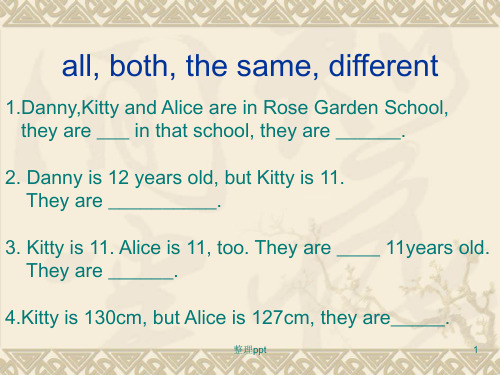
整理ppt
6
一般过去时( 表示过去某时发生的动作) 肯定句: 主+ (动词原形+ed) 否定句: 主+ didn’t + 动词原形
一般疑问句: Did +主 + 动词原形
时间标志: yesterday yesterday morning ( afternoon, evening) the day before yesterday
❖ young—younger –the youngest
❖ tall—taller—the tallest/short
❖ nice—nicer –the nicest 比较级和最高级有变化规则,
❖
big—bigger
–the
biggest
且比较级是两者比较。 最高级是三者或三者以上比较。
❖ fat—fatter—the fattest
always > usually > sometimes >never
总是 通常
有时 从不
一直
整理ppt
3
动词第三人称单数形式:
He is younger than me.
Ben sometimes washes the dishes with her mother.
一些变化:
go-goes
like-likes live-lives
整理ppt
2
Adverbs of Frequency(频率副词)
❖ Ben: I always go to the supermarket with my mum. ❖ Kitty: I usually go to the supermarket with my mum. ❖ Alice: I sometimes go the supermarket with my mum. ❖ Eddie: I never go to the supermarket with my mum.
[牛津中小学英语网]6Aunit1,unit2知识点复习
![[牛津中小学英语网]6Aunit1,unit2知识点复习](https://img.taocdn.com/s3/m/678fc35310661ed9ac51f302.png)
[牛津中小学英语网]6A u n i t1,u n i t2知识点复习-CAL-FENGHAI.-(YICAI)-Company One11.写出下列单词聪明的:愚蠢的:大笑:指着:大叫:Story time1.There be 句型中be 动词填空1)be 动词有:注意点:先判断时态,一般现在时、现在进行时用一般过去时用was + 单数名词或不可数名词(water, juice, coffee, milk, tea, bread, rice)were +可数名词复数2)就近原则3)there be 不能和哪个单词连用?2.:为...做3.show sb sth=4.try on put on take off试穿鞋子:试穿他们5.these this that those6.in + on+人7.people:8.point at.cartoon time1.告诉某人某事给某人某物2.each的用法Each student says one sentence. 每个学生说一句话。
Each后面接名词,表示“每个……”,谓语动词(be动词或者行为动词)用形式3.turn的用法(1)It’s Bobby’s turn. 该轮到Bobby了。
turn 作名词,意为“轮流”“依次轮流的顺序”。
例如:轮到你了:轮到他们了:轮到我妈妈了:(2)向右转:4.have to 不得不 have to +5.Look after:课堂练习选择题1. Long long ago,there _______ a prince. A. is B. were C. was2. Let me make a puppet _____ you. A. with B. to C. for3. Mike _______ at the plate on the table .A. pointedB. pointsC. pointing4. There are a lot of ______ in the classroom.A. a peopleB. peoplesC. people5. ______ beautiful clothes!A. WhatB. What’sC. How6. Ben ofen _______ with his parents in the park after dinner .A. walkB. walkedC. walks7. Who can _______ clothes for me?A. makingB. makesC. make8. It is _______ turn.A. Helen’sB. HelenC. Helens9. The king isn’t wearing _______ clothes.A. aB. anyC. some10. The king walked through the city _______ his new clothes.A. try onB. wearC. in用所给单词的适当形式填空。
小学英语教案:2020牛津6A复习资料及复习题(新版译林版)

2020牛津英语6A复习资料及复习题(新版译林版)6a unit 1 the king’s new clothes 一,单词/词组 1. long long ago 很久以前2. new clothes 新衣服 3. make new clothes for you 为你制作新衣服 make sth for sb 4. show the king his new clothes给皇帝展示新衣服 show sb. sth.=show sth. to sb. 5. try on 试穿 try on the coat=try the coat on try it/them on 6. magic clothes 有魔力的衣服 7. walk through步行穿过 8. in his new clothes 穿着他的新衣服 9. shout at sb. 对某人大叫 10. laugh at sb.对某人大笑 11. look at 看…. 12. point at 指向… 13. fit well 非常适合 14. an american cowboy 一个美国牛仔 15. a scottish man 一位苏格兰人 16. tell a story 讲一个故事 17. say a/one sentence 说一句话18. on the mountain 在山上 19. the next sentence 下一句话 20. live in the house 住在房子里 21. tell the boy a story 给这个男孩讲一个故事tell sb. sth. 22. it is one’s turn 某人的机会 23. think hard 努力思考 24. have to 不得不 have to do sth. 25. in front of 在….前面(外部) in the front of 在… 前面(内部) 26. walk by 路过 27. be nice to sb. 对某人好。
- 1、下载文档前请自行甄别文档内容的完整性,平台不提供额外的编辑、内容补充、找答案等附加服务。
- 2、"仅部分预览"的文档,不可在线预览部分如存在完整性等问题,可反馈申请退款(可完整预览的文档不适用该条件!)。
- 3、如文档侵犯您的权益,请联系客服反馈,我们会尽快为您处理(人工客服工作时间:9:00-18:30)。
瓦市小学牛津英语6A模块1口试复习资料1、重点词汇:Unit1:live in the same flata new blockin Grade Sixolder brotheryounger sistertime for bedgo to the supermarketdo my homeworkwash the disheswatch televisiongo to the beachgo to the cinemawalk in the parkshortertallersmallerbiggeralwaysusuallysometimesneverUnit2:a puppyin different blocks in Block 3a housing estate play togetherplay with their dogs after school heavier than thinner thanageheightweightits manehelp each other share our lunchat the weekend walk to school centimetre kilogrammeskatecycledress uplike to do sth.the fourteenth floor Unit3:holidaytomorrowhave a picnicsee some birdssee a fountainswimming poolbird aviarypicnic areafootball pitchPeople’s SquareCity Centre Stationthe Space MuseumDragon BayEast End stationget to City Park;take the underground toStar Ferrysing loudlywalk quietlyfly quicklyswimming slowlylook for something to eatnutwalk intowrite soon2、重点句型:1. 形容词比较级结构:Ben is young, but I’m younger. Your dog is small, but mine is smaller.Your family is smaller than mine.Kitty is thinner than Alice and Danny.2. 日常用语A: How do you do?B: How do you do?A: Nice to meet you.B: Nice to meet you, too.A: I like to run. How about you?B: I like to skate.3. How many people are there in your family?There are (only)five people in my family.4. 想要做什么want to do---What do you want to do? --- I want to visit City Park..5. 表示将来时be going to---What are you going to do? --- I’m/ We’re going to visit City Park.6. take交通工具to某地,如何达到某地及回答---How are we going to get to Moon Park?--- We’re going to take a bus to Moon Park. 划线部分可用there 代替7. 以Let’s 引导的祈使句Let’s go to the aviary quickly.3、人文知识1、理解家庭成员之间的称呼grandfather, …2、了解西方人住宅、门牌号码表达方式Flat2B,Block1,Rose Garden Estate3、了解英语写信格式(参照P14)4、掌握专有名词的表达方法,标牌全部大写Moon Park,The Space Museum5、复习国际音标,能正确发音,拼读单词6、掌握T ommy Target所列的内容p6,P10,P14.瓦市小学牛津6A模块2复习提纲1、重点词汇:Unit1:fireman (复数firemen) 消防员drive a fire-engine 开消防车put out fires 灭火policeman (复数. policemen) 男警察help make Garden City a safe place 帮助创造花园城市安全policewoman (复数. policewomen)女警察fisherman (复数. fishermen)渔民catch fish 抓鱼astronaut 宇航员fly a spacecraft 开宇宙飞船pilot 飞行员fly an aeroplane(plane)开飞机farmer 农民grow food 种粮食shop assistant 营业员sell things to people 卖东西跟别人cook 厨师cook food for people 给人们做菜doctor make sick people better 使病人好转nurse help make sick people better 帮助使病人好转waiter 男服务员bring food to people 拿食物给别人teacher教师teach children 教育孩子dentist 牙医(拓展词汇)make our teeth better 使我们的牙齿更好postman (复数postmen) 邮递员(拓展词汇)bring letters to your house送信到家Unit2:7-Eleven七十一便利店kindergarten幼儿园tennis court 网球场playground操场on the ninth floor在第九楼tenth 第十eighteenth 第十八the top floor 顶楼the tallest block 最高大楼on the left of 在…左边on the right of 在…右边an address 一个地址telephone number 电话号码kitchen 厨房bathroom 浴室bedroom 卧室sitting-room 客厅,起居室the biggest flat 最大的公寓Unit3:is crowded with 被…拥挤move along slowly沿着慢慢地移动traffic jam交通堵塞a lot of 大量的a litter bin 垃圾桶a pavement 人行道a lamp post 灯柱traffic交通a crossing 十字路口a post box 邮箱a bus-stop 汽车站traffic light 交通灯minibus 小型公共汽车,小巴lorry(复数lorries)货车tram-stop电车站leave my flat 离开我的公寓the nearest最近的the underground station 地铁站get on the bus 上车get off the bus 下车Prince Station 王子车站sit on the bus坐在公交车上Unit4:zebra crossing 斑马线on our way to school 在我们去上学的路上look left again再看左边wait on the pavement 在人行道上等待turn right 向右拐弯walk (run)across 走(跑)过right or wrong 对还是错turn left 向左拐弯cross the road 过马路park your car 停车2、重点句型:1. Firemen put out fires. A pilot flies an aeroplane.(单三)2. What job do you do? 你做什么工作?What job does your father do? 你爸爸做什么工作?3. What do you usually do? 你通常做什么?What does she usually do? (单三)4. What do you want to be? 你想成为什么?Why? 为什么?5. Do you like your job? Yes, I do./ No, I don’t. 你喜欢你的工作吗?Does she like her job? Yes, she does. / No, she doesn’t. 她喜欢她的工作吗?6. like to do sth. 和want to do sth. 句型。
I like to help people. He likes to help people.I want to catch fish. She wants to catch fish.7. Where do Ben and Kitty live? Ben和Kitty住在哪里?Where does Eddie live? Eddie住在哪里?8. Who lives in the tallest block?谁住在最高的大楼?9. What’s your address? I live at Flat 18B, Block 2, Rose Garden Estate, Garden City.你的地址?我住在18B公寓,2号楼,玫瑰花园小区,花园城市。
What’s …’s address? He/ She lives at …10. What’s your telephone number? 你的电话号码?What’s …’s telephone number?11. Can you see any lorries? How many are there? There are two. / There is one.你看到卡车了吗?有几辆?有2辆/ 有1辆。
12. Did you see any cars? Yes, I saw seven cars. / No, I didn’t see any cars.你看到车了吗?是的,我看到7辆/不,没有。
13. How do you go to school? I take a bus to school. / I go to school by bus.你怎样上学?我坐公交车上学。
